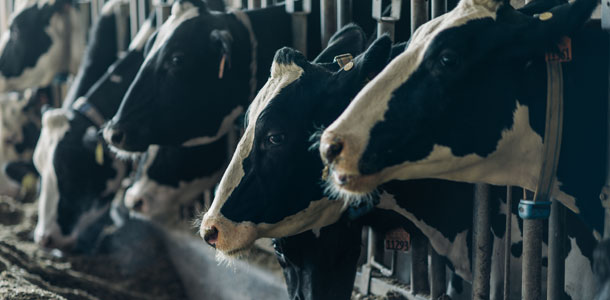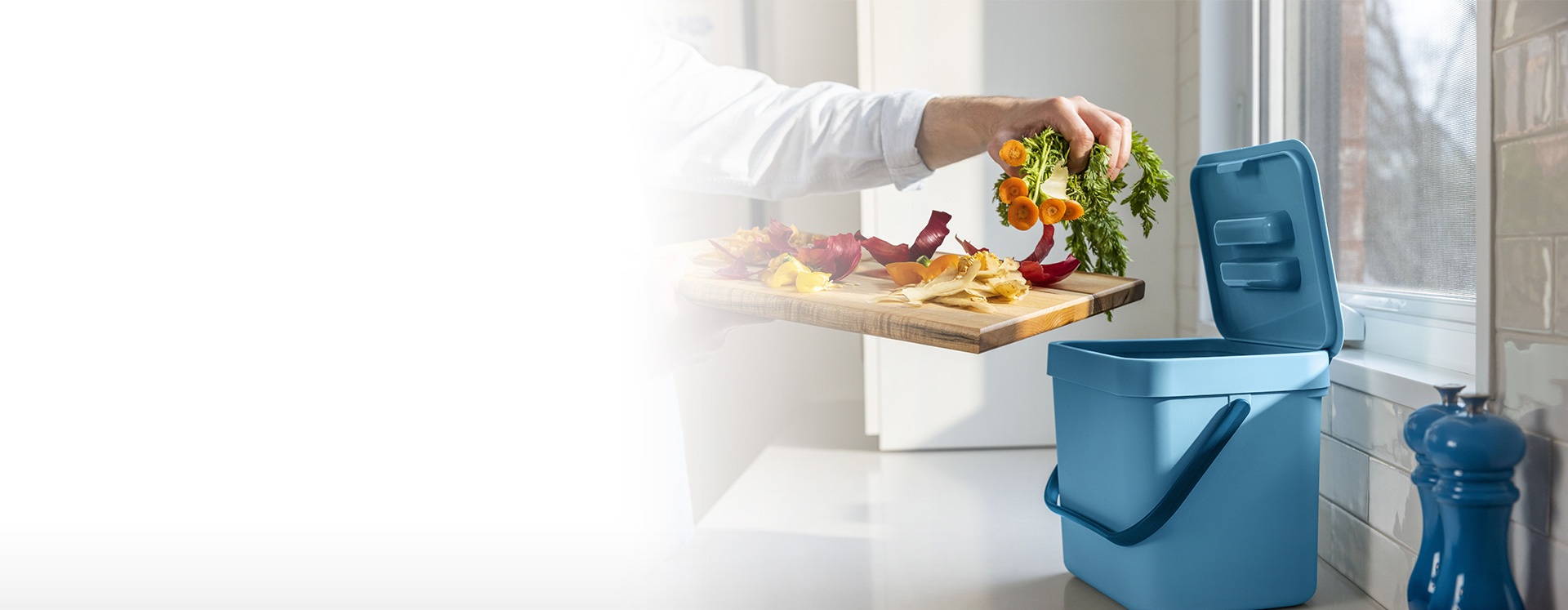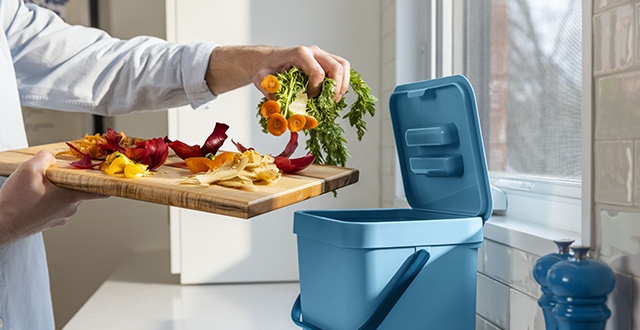All our customers can now choose renewable natural gas (RNG) in their purchasing profile.
What is renewable natural gas?
It is 100% renewable energy produced from organic waste. RNG replaces fossil fuel energy with renewable energy in the gas network to reduce greenhouse gas (GHG) emissions targeted by the fight against climate change.
Renewable natural gas: a key part of the energy transition

Reducing greenhouse gas emissions from fossil fuels
Renewable natural gas (RNG) reduces the greenhouse gas emissions targeted by the fight against climate change in two ways: by recovering the methane produced by the natural decomposition of organic matter, and by replacing fossil fuel with a renewable energy source. Moreover, as part of the fight against climate change, Énergir has a regulatory obligation to deliver a certain amount of RNG to its network.

Value-added organic waste
Turning your vegetable peels or other food waste into RNG is easier than you think! The methane emitted by the decomposition of organic matter can be recovered to produce renewable energy. The RNG production process also produces a fertilizer that can be used, under certain conditions, on flower beds and farmland.

Energy that can be locally produced
Did you know that your municipality can produce renewable natural gas using your organic waste? It is in fact a very effective solution for municipalities in managing their waste.

Organic waste that pays off
Waste with energy to spare: I’ll buy that! RNG production can be an opportunity for municipal governments, farmers and other types of businesses to turn their organic waste into new streams of revenue.
How is RNG distributed?
The RNG purchased by Énergir is injected into the North American gas network (of Énergir and other distributors) where fossil natural gas circulates. Renewable natural gas and fossil natural gas therefore circulate in the same pipes. Since the molecules of renewable and fossil natural gas travel together and are completely interchangeable, it's impossible to differentiate between what's actually going to customers' appliances. The volumes of RNG you purchase are shown on your detailed invoices for total natural gas consumption.
Shining the spotlight on some local producers
To meet the growing demand for renewable natural gas, Énergir is sourcing from North American producers, including a growing number in Quebec.
Saint-Hyacinthe
In operation since January 2018, Saint-Hyacinthe was the first city in Quebec to produce energy through biomethanation and move one step closer to energy self-sufficiency. The amount of RNG it produces is sufficient, among other things, to heat buildings and power city vehicles while reducing greenhouse gas emissions from fossil fuels. It’s a great example of a community repurposing waste to produce renewable energy.

Coop Agri-Energy Warwick
Coop Agri-Énergie Warwick is the very first agricultural cooperative dedicated to renewable energy production in Quebec. It brings together a dozen agricultural producers from the Arthabaska RCM, which have been producing renewable natural gas from slurry and dairy cattle manure mixed with residual organic matter from local businesses since spring 2021. The biomethanation facilities were developed, built and are run by Coop Carbone, a non-profit solidarity cooperative working to develop cooperative agricultural biomethanation projects.
City of Québec
Since February 2024, the City of Québec has been injecting renewable natural gas into Énergir’s network. The Québec agglomeration biomethanation centre (CBAQ) treats up to 86,600 tonnes/year of food waste, as well as up to 96,000 tonnes/year of biosolids from the wastewater treatment plant.

Thinking of becoming a renewable natural gas producer?
We’ve put together an information guide (in French only) for those interested in renewable natural gas (RNG) projects.
Looking for a site suitable for renewable natural gas production?
We mapped Canada’s 2021 Census of Agriculture to help developers position their projects at the centre of organic deposits and close to our network.

Yes, if it’s produced from a renewable source. There are five main sources of renewable energy: the sun, wind, water, the earth (geothermal energy) and organic matter. Organic waste is used in the case of renewable natural gas (RNG). Things like table scraps, wastewater, manure and agricultural slurry all have very short renewal cycles.
Énergir is working hard to reduce the carbon footprint of the natural gas it distributes, and believes that RNG is one of the ways to get there. Energir’s regulatory target is to distribute 5% of RNG to its network in fiscal 2025–2026 as a replacement for fossil natural gas. To ensure the distribution of growing volumes, Énergir is sourcing from various North American producers, including a growing number in Quebec. Quebec’s RNG industry has the potential to go much further, and our teams are working hard to mobilize all the players involved in its development.
Our wish is to get the full value out of every food item. However, we are aware that no matter how hard we try to reduce food waste, certain organic materials such as pits, scales and some skins and peels will never be eaten. With renewable natural gas, we want to reuse the organic matter that ends up brown bins to give it a second life bursting with energy.
Énergir firmly believes that making complementary use of a variety of energy sources is an effective way of reducing greenhouse gases from fossil sources. As we always say, you need the right energy in the right place!
That’s why we’re using renewable natural gas to decarbonize energy uses that are difficult to electrify. This is particularly the case when a flame is required in an industrial process, or to heat buildings in areas where electrical capacity is saturated.
To meet regulatory targets for RNG deliveries, Energir sources most of its RNG from producers in North America. It is working to increase its supply from producers in Quebec.
The quantity of RNG purchased by Energir from each producer is injected by the latter into the gas network of the region where the producer is located. It can therefore be injected into the gas network of Energir or another distributor in North America, and then mixed with the fossil natural gas circulating in the same gas network. So, as with its fossil natural gas supply or electricity supply, once the purchased energy is injected into the gas or electricity grid, it is not possible to track the gas molecule or electron. The gas molecule or electron is consumed by the various users connected to these networks.
The quantity of RNG purchased by Énergir reduces the quantity of fossil natural gas that Énergir buys as part of its overall supply. Given that RNG and fossil natural gas molecules circulate in the same gas network and mix without it being possible to distinguish between them, Energir has its total annual supply from RNG producers verified by the Bureau de normalisation du Québec to be at least equal to the quantity of RNG purchased by all its customers, and that the RNG purchased is of 100% organic origin (and does not include any fossil molecules).
RNG combustion is not emission-free; it generates GHG emissions (CO2, CH4 and N2O) in the same way as the combustion of fossil natural gas. CO2 is the main GHG that is generated (over 99% of combustion emissions). However, unlike the emissions resulting from the combustion of fossil natural gas, CO2 emissions from RNG combustion are not included in emissions targeted by the fight against climate change. Fossil natural gas combustion releases CO2 that has been sequestered for millions of years in geological formations. In contrast, the CO2 released into the atmosphere from RNG combustion (known as biogenic CO2) was sequestered in organic matter (food waste, manure, wastewater, etc.) that renews much more rapidly. Biogenic CO2 was therefore in the atmosphere not so long ago, was absorbed by organic matter, and will be re-absorbed. The effect of biogenic CO2 on the climate depends on a variety of factors, including the source of organic waste.
Although also biogenic, N2O and CH4 combustion emissions (less than 1% of combustion emissions) from RNG must be reported in the direct emissions (Scope 1 emissions) of the person or entity using RNG in their GHG inventory.
The biogenic CO2 emitted during combustion must also be quantified, but reported separately from Scope 1 emissions in the GHG inventory. Regulations governing the GHG cap-and-trade system (CATS) stipulate that these CO2 emissions must be reported, but do not have to be covered by emission allowances under Quebec’s GHG cap-and-trade system.
In contrast, all GHG emissions (CO2, CH4 and N2O) from fossil natural gas combustion must be reported in the direct emissions (Scope 1 emissions) of the person or entity using fossil natural gas in their GHG inventory.
RNG production emits GHGs. GHGs are also emitted during RNG transmission and distribution.
Énergir has a regulatory obligation to deliver a minimum amount of RNG during its fiscal year (2% in 2023-2024, 5% in 2025-2026 and 10% in 2030-2031). If customers do not voluntarily purchase a portion of that RNG, Énergir has to socialize the cost of the unsold volumes among customers who do not purchase the minimum quantity required by regulations. Thus, if demand from voluntary customers does not exceed the regulatory threshold regarding the quantity of RNG to be delivered, voluntary purchases will not impact the reduction of GHG emissions in Québec attributable to RNG. Conversely, if voluntary purchases exceed that regulatory threshold, they enable a further reduction of GHG emissions from RNG with respect to Québec.
Customers can include their RNG purchases in their GHG inventory. For more details on how to include GHG emissions from RNG combustion in a GHG inventory, see the question above “How are GHG emissions from RNG combustion accounted for?” .
It is a tarif that allows the distribution of the costs associated with the volume of RNG required to meet its regulatory obligation and unsold to voluntarily customers. Under a regulatory obligation, Énergir is required to deliver a certain quantity of RNG in its network. When part of this RNG is not voluntarily purchased by its customers, Énergir must socialize the cost of the remaining volumes among customers who do not purchase the minimum quantity required by regulation.
We've put together a best practice guide for anyone interested in renewable natural gas (RNG) projects.
- Project sponsors
- Manufacturers with organic materials
- Agricultural producers who wish to participate in or carry out an RNG project
Consult the guide (in french only)

